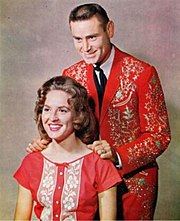
Jane Marie Fricke, known professionally as Janie Fricke, is an American country music singer, songwriter, record producer, and clothing designer. She has placed seventeen singles in the top ten of the US Billboard Hot Country Songs chart. Eight of these songs reached the number one spot on the Country music chart. She has also won accolades from the Academy of Country Music, Country Music Association and has been nominated for four Grammy Awards.
"No Charge" is a country music song, written by songwriter Harlan Howard. It was first recorded by country singer Melba Montgomery, whose 1974 version was a #1 country hit in both the US and Canada, as well as making #39 on the US pop charts. In the UK, the song is associated with J. J. Barrie, whose 1976 version was a #1 UK hit.

Ladies' Choice is an album by American country music artist George Jones, released in 1984 on the Epic Records label. It was composed largely of duets with female artists.
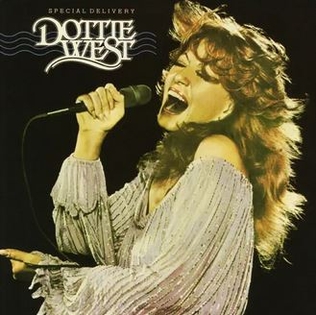
Special Delivery is a studio album by American country artist Dottie West. It was released by both Liberty Records and United Artists Records in November 1979. The album was released following a successful commercial comeback in West's career. Its new country pop production style was considered a departure from her previous recordings. The project consisted of ten tracks, six of which were composed by producers Randy Goodrum and Brent Maher. Three of the tracks were singles, including West's first solo chart-topper "A Lesson in Leavin'". Special Delivery reached the top 20 of the US country chart and was among her longest-running albums on the country survey

The albums discography of American country artist, George Jones contains 80 studio albums, 132 compilation albums, three live albums, ten video albums and seven box sets. Of his studio albums, 69 are solo releases while 11 are collaborative releases. In 1956, Jones's debut studio LP was issued on Starday Records titled, Grand Ole Opry's New Star. The label only issued one studio effort, but would release a series of compilation. On Mercury Records, Jones released six studio LP's including Country Church Time (1959) and George Jones Salutes Hank Williams (1960). He switched to the United Artists label in 1962, where he released 13 studio LP's. Among these was a collaborative LP with Melba Montgomery called What's in Our Hearts (1963), which was his first to chart the Billboard Top Country Albums survey. He moved to Musicor in 1965. Among the label's studio LP's was I'm a People (1966), which reached the top of the Billboard country survey. Musicor also issued his first collaborative studio album with Gene Pitney, which made the Billboard country LP's chart and the Billboard 200.

"Why Me" is an American country and gospel song written and recorded by American country music singer and songwriter Kris Kristofferson.
"We Must Have Been Out Of Our Minds" is a song made famous as a duet by country music singers George Jones and Melba Montgomery. Originally released in 1963, the song became a Top 5 hit on the Billboard Hot Country Singles chart and a country music standard.

The discography of American country artist, Melba Montgomery contains 29 studio albums, eight compilation albums, 61 singles, one other charting song and has appeared on five albums. Of her studio albums, 22 are solo releases while seven are collaborative releases. Of her singles, 42 are solo releases while 18 are collaborative. Montgomery collaborated with George Jones on 1963's "We Must Have Been Out of Our Minds", which reached number three on the Billboard Hot Country Songs chart. Together, they recorded several studio albums including What's in Our Heart (1963), which reached number three on the Billboard Top Country Albums chart. The United Artists and Musicor labels issued several more singles by the pair. Among them were the top 25 songs "Multiply the Heartaches" (1965) and "Party Pickin'" (1967). She also collaborated with Gene Pitney during the sixties on the top 20 single "Baby Ain't That Fine" (1965). Both United Artists and Musicor issued several solo studio albums and singles by Montgomery during the sixties also. Among them was the charting single "Hall of Shame" (1963) and the 1967 LP, Don't Keep Me Lonely Too Long (1967).

The albums discography of American country artist Dottie West contains 28 studio albums as a solo artist, five studio albums as a collaborative artist, 18 compilation albums and additional album appearance. Among West's studio releases were five collaborative albums with various artists, including Kenny Rogers. After signing with RCA Victor Records in 1963, West released her debut studio album Here Comes My Baby (1965). The album peaked at number 12 on the Billboard Top Country Albums chart in July 1965. West's third studio album Suffer Time (1966) spawned four singles, including "Would You Hold It Against Me", a top 5 hit on the Billboard Hot Country Songs chart. Suffer Time would reach number 3 on the country albums chart, West's highest-charting solo album. Between 1967 and 1968, West released 5 more studio albums. With All My Heart and Soul (1967) featured the top 10 hit "Paper Mansions" and the album itself peaked at number 8 on the Top Country Albums list. In 1969, she paired with Don Gibson for her first collaborative project Dottie and Don. The album featured the pair's number 2 Billboard country hit "Rings of Gold". In 1970, she collaborated with Jimmy Dean on the studio release Country Boy and Country Girl. In 1973, West had her biggest hit with the single "Country Sunshine". Its corresponding album of the same name peaked at number 17 on the country album chart in February 1974.
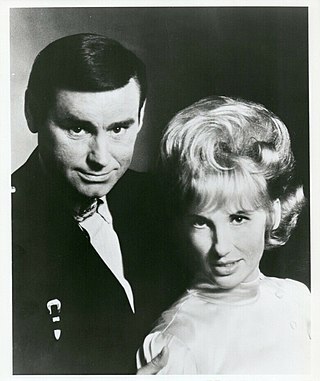
The discography of American country artists George Jones and Tammy Wynette contains the recordings they made as a vocal duo. Their discography includes nine studio albums, 14 compilation albums, 15 singles and one music video. In October 1971, the duo's first studio album was released by Epic Records and was titled We Go Together. It peaked at number three on the American Billboard Top Country Albums chart and number 169 on the Billboard 200 list. Included on the disc was the duo's first single, "Take Me". It reached the top ten on the American Billboard Hot Country Songs chart and the top 20 on the Canadian RPM Country Tracks chart. It was followed by their second studio album called Me and the First Lady, which charted at number six on the Billboard country list. Featured on the disc was their second top ten single, "The Ceremony".

Don’t Let the Good Times Fool You is a studio album by American country artist, Melba Montgomery. It was released March 17, 1975 via Elektra Records and was the twentieth studio album in her recording career. The disc contained 11 tracks featuring mostly original material, some of which was penned by Montgomery herself. Four singles were included, which all placed on the country charts. Among them was the title track, which reached the top 20 in 1975. The album itself also charted on the American country albums survey in 1975. It received a positive review from Billboard magazine following its release.
"Don't Let the Good Times Fool You" is a song written by Ronald Hellard and Gary S. Paxton. It was recorded and released as a single by American country artist Melba Montgomery in 1975.
"Something to Brag About" is a song written by Bobby Braddock that was recorded as a duet between American country artists Charlie Louvin and Melba Montgomery. It was also issued as a single in 1970.

The singles discography of American country artist, George Jones, contains 182 singles. Of the total, 136 were released with Jones as the solo artist. In addition, 31 were issued with Jones being part of a collaboration. Thirdly, eight singles were issued with Jones being part of a featured act. Fourthly, seven released were promotional singles. Additionally, 14 songs that are not released as singles are included that made any major chart. Finally, 21 music videos which were first issued as singles are also listed. Jones had his first chart success in 1955 with several top ten Billboard Hot Country Songs singles: "Why Baby Why", "What Am I Worth" and "You Gotta Be My Baby". After several more top ten releases, "White Lightning" became his first to top the Billboard country chart. Along with "Who Shot Sam", both singles were also his first to make the Hot 100 charts.

Count Your Blessings, Woman is a studio album by American country music artist, Jan Howard. It was released in June 1968 on Decca Records and contained 11 tracks. Most of the disc featured covers of popular songs of the era. The album's title track was spawned as a single, becoming a top 20 song on the Billboard country chart in 1968. Additionally, the album would reach peak positions on the American country albums chart. It was reviewed positively by Billboard magazine.

No Charge is a studio album by American country artist, Melba Montgomery. It was released in April 1974 via Elektra Records and was the nineteenth studio collection of Montgomery's career. The disc contained a total of 12 tracks which mixed in different styles of country music. Its title track topped the country charts in the United States and Canada in 1974. The album itself reached the top 20 of the American country LP's chart in 1974 and received positive reviews following its release.
"Wrap Your Love Around Me" is a song recorded by American country artist, Melba Montgomery. It was composed by Montgomery, along with Jack Solomon. It was the first single of Montgomery's released on Elektra Records and reached the top 40 of the American country songs chart in 1973. It was included on her 1973 eponymous studio album. It was met with positive reception from Billboard magazine in 1973.

Melba Montgomery is a self-titled studio album by American country artist, Melba Montgomery. It was released in October 1973 via Elektra Records and contained 12 tracks. The disc was Montgomery's first with the Elektra label and eighteenth album overall. Material on the album mixed both uptempo numbers with ballads. New selections along with cover songs were included. The album included two singles. The first single, "Wrap Your Love Around Me", reached the top 40 of the American country songs chart in 1973. The album received positive reception from Billboard magazine following its release.
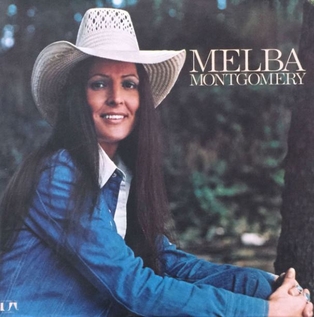
Melba Montgomery is a eponymous studio album by American country artist, Melba Montgomery. It was released in March 1978 via United Artists Records and was the twenty second studio disc of her career. The album featured a total of ten tracks, four of which were originally released as singles. Its most commercially-successful was a cover of "Angel of the Morning". The song reached both the American and Canadian country charts in 1978.
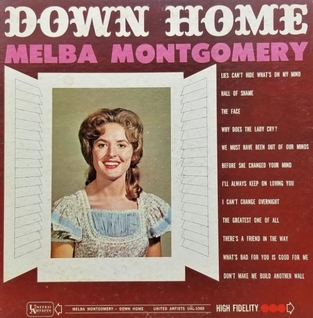
Down Home is a studio album by American country artist, Melba Montgomery. It was released in August 1964 via United Artists Records and contained 11 tracks. It was the third studio disc released in Montgomery's recording career and her second as a solo artist. Many of the album's tracks were penned by Montgomery herself. Two of its singles reached charting positions on the American country songs chart. It received a positive review from Billboard magazine in 1964.

